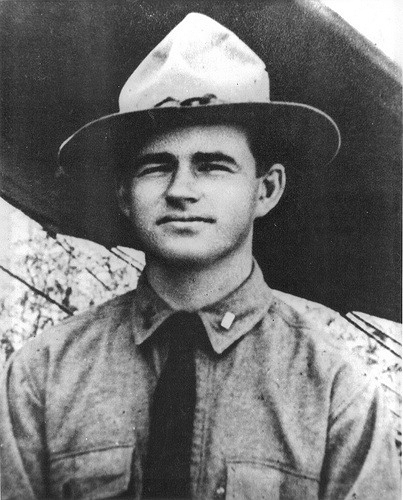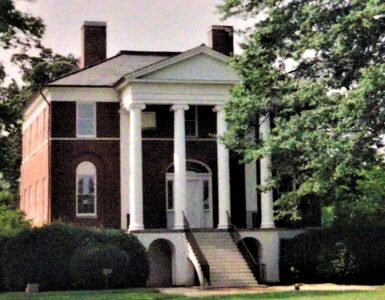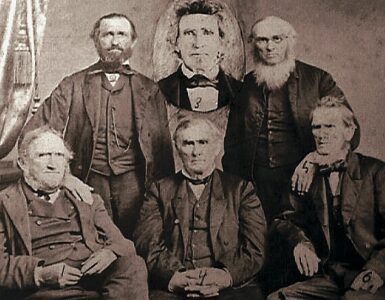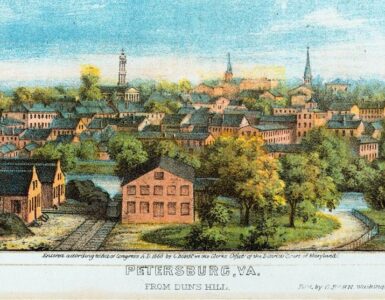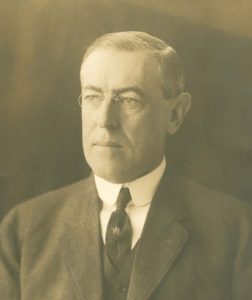 Thursday April 6, 2017 marks the centennial of the United States entering the First World War during the administration of Presbyterian President Woodrow Wilson. Known in its era as The Great War, it had been raging since August 1914. The number of casualties already numbered in the millions when the Doughboys entered the trenches to fight. Along with the American military presence were chaplains from Christian denominations as well as other religions. Because of an oversupply of ministers for the chaplaincy some ministers turned to organizations such as the Y.M.C.A. as venues for service. For example, to read letters written home by a Presbyterian Y.M.C.A. worker see, Letters from the Front: J. Gresham Machen’s Correspondence from World War I, 2012. For further information regarding involvement of the United States in World War I, see the informative website of The National World War I Museum in Kansas City, Missouri, which is having a special remembrance of the centennial on April 6, “In Sacrifice for Liberty and Peace.” Also, the B.B.C. has an extensive site remembering the great sacrifices made by Great Britain during the war, “World War One.” The following biography is of a chaplain of the Presbyterian Church in the United States (P.C.U.S.).
Thursday April 6, 2017 marks the centennial of the United States entering the First World War during the administration of Presbyterian President Woodrow Wilson. Known in its era as The Great War, it had been raging since August 1914. The number of casualties already numbered in the millions when the Doughboys entered the trenches to fight. Along with the American military presence were chaplains from Christian denominations as well as other religions. Because of an oversupply of ministers for the chaplaincy some ministers turned to organizations such as the Y.M.C.A. as venues for service. For example, to read letters written home by a Presbyterian Y.M.C.A. worker see, Letters from the Front: J. Gresham Machen’s Correspondence from World War I, 2012. For further information regarding involvement of the United States in World War I, see the informative website of The National World War I Museum in Kansas City, Missouri, which is having a special remembrance of the centennial on April 6, “In Sacrifice for Liberty and Peace.” Also, the B.B.C. has an extensive site remembering the great sacrifices made by Great Britain during the war, “World War One.” The following biography is of a chaplain of the Presbyterian Church in the United States (P.C.U.S.).
In 2011, ninety-three years after the death of Presbyterian Chaplain Thomas McNeill Bulla (1st Lieutenant) in France during the First World War, the Virginia National Guard honored his heroism with the highest decoration given by the state, the Virginia Distinguished Service Medal and in a separate ceremony dedicated the chapel at Fort Pickett, “Bulla Chapel.” His family was presented the medal at the church he was serving when he entered the war, First Presbyterian Church in Emporia. Chaplain Bulla served with the 3rd Battalion, 116th Infantry, 29th Division. His dedicated service had already been acknowledged by the state of Virginia in 1999 with a historical marker on South Main Street in Emporia. The marker recounts that during the intense and determined fighting of the Germans in the lengthy Meuse-Argonne Offensive, Chaplain Bulla, on October 15, 1918, though wounded himself, ventured into no-man’s land, and brought wounded soldiers back to the trenches. He died two days later from his wounds. He was the only chaplain of a Virginia regiment to die in The Great War. In Emporia, American Legion Post 46 had adopted the name, “Bulla Post,” in 1924, and the Presbyterian Church remembered its pastor with a stained glass window memorial.
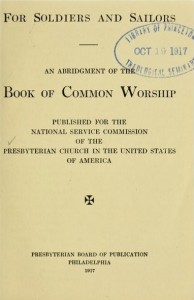 So what made Chaplain Bulla risk his life to save the lives of Doughboys that were afraid, suffering, and dying in no-man’s land while surrounded with the smell of burnt powder and the stench of death? Was there something particularly extraordinary about the young chaplain’s background that might hint at his selfless service in The Great War? No, there was nothing unusual about his birth and childhood. Thomas McNeill was born on a farm near Fayetteville, North Carolina, to Thomas Daniel and Elmira McDaniel Bulla on January 4, 1881. The Fayetteville area had been settled by immigrants from Scotland and the Daniel and McDaniel (son of Daniel) names show the demographics of the region. However, Bulla can be traced to a Latin origin which describes a seal that might be recognized by church historians for its association with a papal bull. In Scotland, a “bulla” was a “brother” or “comrade.” As with many surnames, the exact etymology and ethnic origin can be obscure, but regardless of the nuances of their ancestry, the Bullas were from immigrant stock and lived as many late Victorian Americans might have lived in the rural Cape Fear area. So, Thomas M. Bulla grew up as so many farming Americans and his immigrant ancestry would have not only included the remembrance of kilts, bagpipes, and dirks, but also the Presbyterian Church as his place for worship.
So what made Chaplain Bulla risk his life to save the lives of Doughboys that were afraid, suffering, and dying in no-man’s land while surrounded with the smell of burnt powder and the stench of death? Was there something particularly extraordinary about the young chaplain’s background that might hint at his selfless service in The Great War? No, there was nothing unusual about his birth and childhood. Thomas McNeill was born on a farm near Fayetteville, North Carolina, to Thomas Daniel and Elmira McDaniel Bulla on January 4, 1881. The Fayetteville area had been settled by immigrants from Scotland and the Daniel and McDaniel (son of Daniel) names show the demographics of the region. However, Bulla can be traced to a Latin origin which describes a seal that might be recognized by church historians for its association with a papal bull. In Scotland, a “bulla” was a “brother” or “comrade.” As with many surnames, the exact etymology and ethnic origin can be obscure, but regardless of the nuances of their ancestry, the Bullas were from immigrant stock and lived as many late Victorian Americans might have lived in the rural Cape Fear area. So, Thomas M. Bulla grew up as so many farming Americans and his immigrant ancestry would have not only included the remembrance of kilts, bagpipes, and dirks, but also the Presbyterian Church as his place for worship.
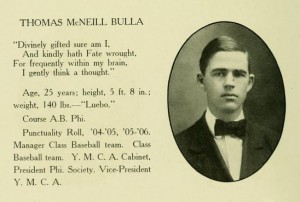 Bulla did not enter the Presbyterian college in Davidson until he was 21 years of age. In the 1907 edition of Davidson College’s yearbook, Quips and Cranks, Thomas McNeill Bulla’s entry includes the verse, which may have been selected by the editors to describe his persona, “Divinely gifted sure am I, And kindly hath Fate wrought, For frequently within my brain, I gently think a thought.” When he graduated, he was 25 years old, stood 5 feet 8 inches tall, weighed 140 pounds, and his nickname was “Luebo.” He had made the punctuality roll in two of his four years (what would college students do today if their punctuality was recorded). He managed and played on the senior class baseball team, was vice president of the Y.M.C.A., and he was the president of the Philosophy Society. He did not make the honor roll, he was not in a fraternity, nor was he on a Davidson intercollegiate sports team. He appears to have been an average student that was not overly involved in extracurricular activities. His studies were rewarded after four years when he was graduated with the Bachelor of Arts in Philosophy.
Bulla did not enter the Presbyterian college in Davidson until he was 21 years of age. In the 1907 edition of Davidson College’s yearbook, Quips and Cranks, Thomas McNeill Bulla’s entry includes the verse, which may have been selected by the editors to describe his persona, “Divinely gifted sure am I, And kindly hath Fate wrought, For frequently within my brain, I gently think a thought.” When he graduated, he was 25 years old, stood 5 feet 8 inches tall, weighed 140 pounds, and his nickname was “Luebo.” He had made the punctuality roll in two of his four years (what would college students do today if their punctuality was recorded). He managed and played on the senior class baseball team, was vice president of the Y.M.C.A., and he was the president of the Philosophy Society. He did not make the honor roll, he was not in a fraternity, nor was he on a Davidson intercollegiate sports team. He appears to have been an average student that was not overly involved in extracurricular activities. His studies were rewarded after four years when he was graduated with the Bachelor of Arts in Philosophy.
After a brief time as a teacher, Thomas went on to seminary for his divinity education. His Fayetteville residence placed him geographically closer to Columbia Seminary, but he instead traveled a bit farther to Union Seminary in Virginia. He completed his course of study in the usual three years. When Fayetteville Presbytery of the P.C.U.S. met in Aberdeen in June 1911, Bulla was licensed to preach and then immediately released to East Hanover Presbytery in Virginia. He was not ordained and installed in First Church, Emporia, until 1913, and as is often the case with ministers serving in rural areas, Rev. Bulla also supplied the Union, Lawrenceville, and Aberdour churches. The combined communicant membership of all four churches was about 130, which means his salary may not have been sufficient but country shepherds knew small churches had limited funds. By the time he left to serve in the chaplaincy he had become the pastor of the Aberdour church along with Emporia and continued as the stated supply for the other two congregations. When Rev. Bulla became Chaplain Bulla in 1917, the total membership of the four churches had grown to 197 with the Emporia church having increased by 64 since 1911. It must have been a difficult decision for Pastor Bulla to leave for Europe and an especially trying time for his four congregations.
In the Oct. 1918 issue of The Union Seminary Review, Professor Walter W. Moore published a brief article titled, “The Seminary and the War.” He traced the seminary’s record of national service in times of conflict back to the War Between the States and noted that some seminary students had died in battle over the years. When war was declared by the United States in 1917 more than a hundred of the students and recent graduates of Union entered the forces with some serving in the army, others as aviators, and then still others were non-combatants working in the ambulance corps, the chaplaincy, camp pastoral ministry, or the Y.M.C.A. Chaplain Bulla was not alone as a Union alumnus when he left home and headed for France.
What was it about Chaplain Bulla that caused him to look out over the top of his trench into no man’s land and crawl into the destructive desolation of battle to rescue the wounded? He seems to have been an average guy from a rural background who simply followed his call to the ministry as the pastor of some rural Virginia churches and then entered the war as a chaplain. When Licentiate Bulla was ordained, he took vows. One of those vows was,
Do you engage to be faithful and diligent in the exercise of all your duties as a Christian and a Minister of the gospel, whether personal or relative, private or public; and to endeavor by the grace of God to adorn the profession of the gospel in your conversation, and to walk with exemplary piety before the flock of which God shall make you overseer?
Having taken this vow, Rev. T. M. Bulla, must have believed that leaving his call to the Virginia churches was necessary “as a Christian and a Minister of the gospel.” It is presumptuous for a historian to claim to know the thoughts of a biographical subject, but if young Bulla was thinking consistently about his ordination vows he had to believe the greater need was with the many facing imminent death in France. So, as he looked into no man’s land and heard the wounded men dying, he knew they were men dying and facing eternity. The injured may have been Christians needing rescue, encouragement in the faith, and medical treatment, or they may have needed not only physical safety and treatment but also the gospel as they faced death. Chaplain Thomas McNeill Bulla, First Lieutenant, adorned “the profession of the gospel” in his “exemplary piety” as he laid down his life for the wounded.
The body of Chaplain Bulla was returned to North Carolina. He was buried near where his father Thomas would be buried in 1926 and his mother Elmira in 1931. As with the multitude of parents that suffered the loss of children in the war, Elmira and Thomas lived for several years after the death of their son having only memories of his life, but included in their thoughts was the knowledge that he had been a caring minister who had sacrificed himself for the good of the wounded soldiers. Chaplain Bulla had lived up to the Scottish meaning of his surname and shown himself to be a true friend and comrade.
Barry Waugh
Notes—During the First World War, many of the units that fought in Europe were National Guard. Also, the biography of a chaplain killed on the U.S.S. Arizona at Pearl Harbor, Chap. T. L. Kirkpatrick, is available on this site. The portrait of President Wilson is from the online collection of the Woodrow Wilson Presidential Library and Museum, Staunton, Virginia. The picture of Chaplain Bulla in uniform is from the U. S. Army Chaplain Museum, Ft. Jackson, South Carolina. Alexander Warrack’s, The Scots Dialect Dictionary: Serving as a Glossary for Ramsay, Ferguson, Burns, Scott, Galt, Minor Poets, Kailyard Novelists and a Host of Other Writers of the Scottish Tongue, 1911, is the source for the use of “bulla” in Scotland. The oval picture of Thomas Bulla was found in the Davidson yearbook that was mentioned in his biography. The edition of the Presbyterian Book of Church Order used for the vow quoted is that of 1894, the book was not revised until 1925. Standard reference works on Presbyterian history and judicatory minutes have been consulted for information. The image of the title page of For Soldiers and Sailors is from a Presbyterian Church in the United States of America (PCUSA) book and was included for context even though Bulla was in the PCUS; it is available for PDF download on this site by clicking,


